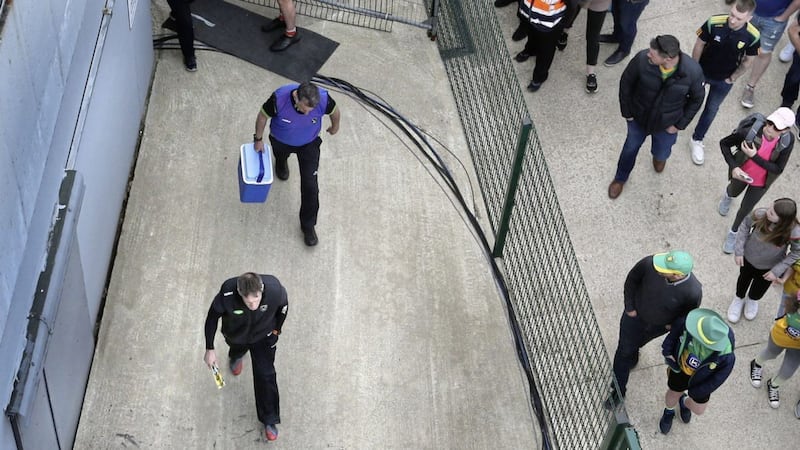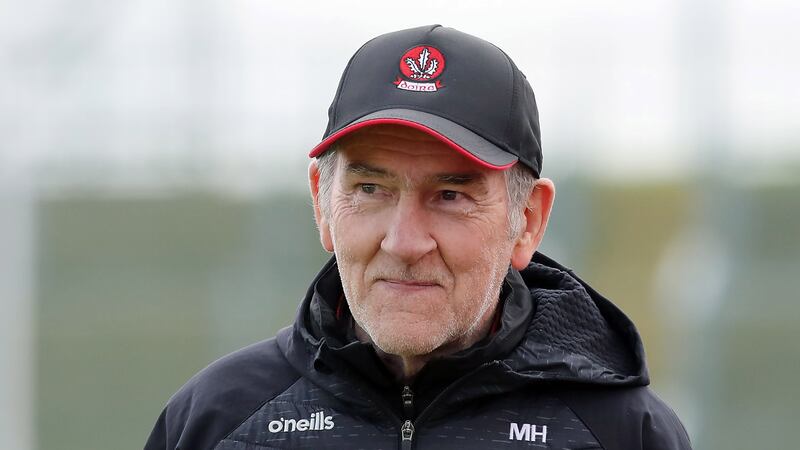“As Sunday approaches and the column inches get filled, we hear more and more theories and stories about what each team is doing and why one will prevail over the other. At the same time, everybody is in fact hedging their bets (me included) just in case people ever find out that nasty secret about most experts. That is, they really are no better at predicting the future than anybody else a lot of the time.”
Kieran McGeeney’s 2016 All-Ireland final preview
THE hum of expectation buzzed in the ear all spring.
And as the sun bared itself in the blue sky above, Armagh and Donegal went to war.
Except one side showed up and the other didn’t. Donegal free-wheeled down the hill into an Ulster semi-final.
This was not Sunday past, but rather June 14, 2015.
Kieran McGeeney’s first championship match as Armagh manager turned to disaster very quickly.
‘Geezer’ had been on the line as assistant to Paul Grimley the previous August when they came so close to a stunning All-Ireland quarter-final at Croke Park, losing by a single point.
Even though Armagh had spent the spring of ’15 in Division Three and missed out on promotion, there was still a feverish anticipation left over from the summer.
Donegal barely needed to put their hands up to protect themselves. The orange jerseys just kept on running into the sea of yellow, spitting the ball up in contact and being killed on the break.
The wily Rory Gallagher preyed on Armagh’s lack of defensive height, isolating Patrick McBrearty early on against James Morgan. Ball into the sky, down it comes, goal.
Then McBrearty would go out and Neil Gallagher came in, causing all sorts of fresh havoc, and Armagh found themselves in an awful muddle. They hadn’t anticipated any of this and were 1-7 to 0-1 down very quickly.
In between times, there was the 2020 semi-final mauling in Breffni Park, when again much was expected but nothing was delivered.
Half-time, 1-12 to 0-3.
The wins were all the same and all different. 2015, the big men rotating inside. 2020, the use of the width of Breffni, pulling Armagh’s defensive ribcage so far apart that the spaces down the middle were catastrophic.
This time it was the midfield battle that did the damage.
To say that Armagh have flattered to deceive on the big days would be an understatement.
Later in the same piece as quoted at the top of the page, McGeeney delved into the area of tactics ahead of Dublin’s 2016 meeting with Mayo. It was revealing of his thinking.
“Tactics, gameplans and the ability to deal with the ‘what ifs’ have been drawn up for this weekend and practiced over the year. However, how players react to any given situation or adversity is always hard to predict. These ‘tactics’ act as an outline to how the game should be played but how this outline is filled in lies with the ability of the player to adapt to that particular situation,” he wrote.
In other words, managers can put systems in place but it’s up to players to implement them.
And he would have a point. We’ll go into the tactical flaws, but so much of what the Armagh players have done in big championship games has been meek and passive.
Yet tactically there was absolutely no secret about what Donegal came with. It’s the same thing they’ve been doing the whole time they’ve been under Declan Bonner.
A big line of men across the middle of the pitch, make the opposition goalkeeper kick it long, win the ball. That’s the basic jist, except they fall short on the scoring so often.
But then you look at it and wonder: well, Einstein, how would you have beaten that Donegal press yourself?
It’s exactly the same site as Dublin’s six-in-a-row was built upon, with their quartet of Howard-Macauley-Fenton-McCarthy.
It’s not easy bypassed. Against both Dublin and Donegal, Mickey Harte’s Tyrone suffered that angst for a long time. Just ask Niall Morgan about 2013.
Yet Tyrone fans would say that had Harte looked about Conn Kilpatrick and Brian Kennedy a bit sooner they wouldn’t have had half the bother they did, and you can point the same finger at Armagh in a way.
They’ve had no consistency of selection at midfield for a long time. A weekend pairing of Connaire Mackin and Ben Crealey was from left-field. Ciaran Mackin was a loss but he wasn’t the answer to aerial strife either.
The positioning of Niall Grimley and Jarlath Óg Burns as wing-backs was to offset the problem, but it became sort of symptomatic of the feeling that you have no idea ever how Armagh will line out.
Aidan Forker at three, Jemar Hall at 10 and Rian O’Neill at 14 have become the only real constants in the team. Everyone else is vulnerable.
At midfield, it’s been exacerbated by the decision to change goalkeeper eight weeks out from the championship.
Blaine Hughes’ kickouts aren’t perfect but he’s faced high pressure situations like this before.
Armagh knew when they prioritised Ethan Rafferty’s ball-playing ability at the end of February that they were going to Ballybofey in April, and how volatile an arena it can be for a goalkeeper.
After Armagh’s win over McGeeney’s former charges in Kildare back in 2017, Lilywhite midfielder Kevin Feely praised the Orchard’s tactics.
“They had a different system to what we had come across altogether in terms of bringing their midfield and half-forwards back into their own half, leaving massive space for their three or four forwards that they'd left up.
“It completely left our backs exposed and it was very naive on our part on the pitch not realising what was happening at the time,” said Feely, again underlining McGeeney’s point that it’s players that matter as much as tactics.
Blaine Hughes was outstanding that day and had been virtually ever-present since barring a few injuries.
The trajectory of his kick is much lower and flatter than Rafferty’s, which on Sunday floated up into the sky off his instep.
That was manna for Donegal’s monsters.
Stepping off Shaun Patton’s kickouts was borne out of the fear of his ability to drive it over the top but being dictated to by the fear of what might go wrong rather than trying to affect the game was a very negative approach to take and allowed Donegal to completely run the show.
Three Ulster Championship wins in eight seasons, against Down, Antrim and Derry, is a very poor record.
Is it too simplistic to say the qualifiers have always suited them because it’s less tactical? You find out who you’re playing on Monday, you go and play them on Saturday.
There isn’t months of intense studying done by the opposition and that’s where Armagh tend to flourish, just as Kildare did in McGeeney’s time.
No team will want them in the qualifiers, still. In unconstrained football, the kind that happens more often outside Ulster and in qualifiers, they're a dangerous outfit.
While Armagh’s line got plenty wrong at the weekend, so did the players. Their lack of aggression in the first half was incredible. If they’d played the other 60 minutes the way they played the first ten of the second half, half this stuff would be redundant.
And yet the players seem happy. Very few ever leave. It’s been a slow ascent to Division One but an ascent nonetheless, and from a very low base.
There is an element of Armagh fans needing to be careful what they wish for.
If – as some do – they want McGeeney to go, who do they want to take over, and would they do any better?
The past is easily read.
The future, not so much.







